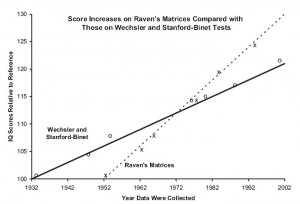In 1984, a psychologist named James Flynn published a chronological study of IQ scores. His research, based upon statistics of American citizens, indicated that our IQ scores have increased immensely over the last 100 years. From the beginning of the 20th century to today, Americans’ IQ scores have increased by three points per decade on both the Stanford-Binet Intelligence Scales and the Wechsler Intelligence Scales. On Raven’s Progressive Matrices intelligence test, Americans’ scores have increased by five points per decade. This trend has since taken the label of “The Flynn Effect.”
Psychometricians (those who study and develop intelligence tests) have updated the intelligence testing throughout the years, which means that what the tests are focusing on is different now than in the early 1900’s. To make comparison possible, what happens if we put our scores on the same scale as back in the day? If we scored our ancestors according to today’s norms, they would have had an average IQ of 50-70. If we compared ourselves to earlier intelligence test norms, the average person today would have had an IQ of 130 to 150 then.
So what is the implication of the Flynn Effect? Were our ancestors really dumb or are we all modern super-geniuses? James Flynn would argue that neither is really the case. Flynn argues that the shift in IQ is caused by new, modern cognitive demands. To understand what these cognitive demands are and where they come from, we must take a look at the historical context of intelligence tests.
A century ago, America was undergoing industrialization and attempting to improve the economy through manufacturing and producing. People tended to be more focused on the concrete. The average citizen had a sixth-grade education when they left school to work (often in a factory), so abstract intelligence and critical thinking were irrelevant to most people. Intelligence tests thus tested crystallized intelligence (knowledge of facts such as capitals of states or names of presidents) and practical intelligence (such as what task one uses a broom for or what time of the year it would be appropriate to wear sandals).
Today, our society has progressed out of our focus on industrialization. Now, as we try to compete globally with our test scores, we tend to place value on math and science, which draw on abstract and critical thinking. This kind of thinking is “deeper” than the kind that underlies crystallized intelligence. In addition, the average citizen now completes at least a high school education, and most middle and upper class people also attend a four-year college. So the type of emphasized intelligence combined with a longer overall education contribute to our increase in test scores over time.
What I take from this research is that our ancestors were not unintelligent, but their mental abilities were not as developed as most people’s are today. We have higher norms of intelligence now than we did a century ago, and our higher IQ scores reflect that change. (James Flynn published an article in 2012 that expands on his original analyses and gives examples of the types of questions seen on an intelligence test in the past versus in modern times. You can read it here.)
There are critics of Flynn’s theory, though. One critic argues that intelligence tests are supposed to test “g,” or general intelligence (the mental energy that underlies all problem-solving). SAT testing is supposedly highly-correlated with “g” and yet our scores do not reflect the same increase as they have with the other forms of intelligence testing that Flynn analyzed. He argues that the increase in scores on intelligence tests is a result of education today coaching students to perform well on paper-and-pencil tests.
Although it may be true that our schools today spend a great deal of time coaching students on how to take tests whereas they did not do that 100 years ago, I disagree that this is the sole reason for our shift in IQ scores. According to the critic, SAT scores are outside of the influence of schools’ focus on paper-and-pencil tests; however, I know I have experienced training in school on how to specifically take the SAT’s and think abstractly in a time crunch.
I believe that since our society has placed value on critical and abstract thinking, it has developed our mind to think in ways we did not think before. This new way is deeper than simply memorizing facts, and so our cognition is more developed, on average, than it was in the beginning of the 20th century.




Really interesting post! When considering educational reform it’s always valuable to reflect on how much our society has changed in the last one hundred years in terms of intellectual capacity and emphasis. And I think it’s great that now more average people are able to think in these advanced and abstract terms. Knowledge is power, right? So I think it would have been great if you took this idea into the greater picture of things. What does it mean for our society to be growing more intelligence? Is it good? Is it bad? Does it come at a price? Right now, this post reads more like a report, but I think you could really make some bigger statements here.
Very informative except don’t forget to tell your readers how IQ tests and SATs work. I understood most of this but I did not understand very well how the process of taking these test changed, what the difference between the two IQ test are, nor what they ask and measure. Be sure that everyone has a clear idea of what you are talking about so they don’t get lost.